SEO
Executive Director Of WordPress On 20 Years Of Innovation

On May 27, 2023, WordPress celebrates 20 years of extraordinary growth. It powers approximately 43% of all websites and is the leading content management system by far.
How did WordPress achieve this milestone and will it be able to continue as arguably the most successful open source project ever?
About This Article
This article was initially conceived as a comparison between Duda, WordPress, and Wix.
However, as I spoke to the developers and people behind the scenes at each company I realized that each platform was the best at solving the problems they set out to solve.
So, what began as one article about three platforms became a three-part series about each platform individually.
Today we look at why WordPress is popular with web design agencies, search marketers, enterprise publishers and ecommerce sites, to name a few successful uses of WordPress.
This article features Josepha Haden Chomphosy (LinkedIn), the Executive Director of WordPress, as well as others who partner with WordPress, to discuss why WordPress is so successful.
WordPress Democratized the Internet
Previous to WordPress one had to spend a small fortune for an enterprise Content Management System (CMS) to obtain what WordPress gives away for free. The alternative was to learn how to code or at the very least to know how to use software like Dreamweaver.
The launch of WordPress democratized online publishing, and arguably became the single most important innovation to spring from the Internet. The positive economic impact on millions of people worldwide cannot be overstated.
A strong case could be made that WordPress, a free open source software, is the most important innovation of the Internet age today.
Secret to Success: Make it Easy to Use
What makes drove the success of WordPress is the fact that it is purposely designed to be easy to install and get publishing fast. This is literally a guiding principle of virtually every decision made in the development of WordPress.
This principle is laid out in an official statement of the WordPress philosophy:
“Great software should work with little configuration and setup. WordPress is designed to get you up and running and fully functional in no longer than five minutes. You shouldn’t have to battle to use the standard functionality of WordPress.
We work hard to make sure that every release is in keeping with this philosophy. We ask for as few technical details as possible during the setup process as well as providing full explanations of anything we do ask.”
Underlying their philosophy is the dedication to freedom.
The webpage on philosophy promises WordPress users:
- “The freedom to run the program, for any purpose.
- The freedom to study how the program works, and change it to make it do what you wish.
- The freedom to redistribute.
- The freedom to distribute copies of your modified versions to others.”
Launched Millions of Businesses
This focus on simplicity, freedom and fostering an ecosystem of innovation has, over the course of the past 20 years, resulted in the launch of millions of websites and the success of millions of businesses around the world.
Tom Zsomborgi, Chief Business Officer at managed web hosting company, Kinsta, had this to say about the power of WordPress:
“Smaller merchants benefit tremendously from WordPress. For them, budget is often limited when it comes to building and maintaining a site, not all can afford a developer.
WordPress gives them the software for free without the need to pay a monthly fee for using it, which includes the free WooCommerce ecommerce plugin that unlocks ecommerce capabilities.
Tens of thousands of plugins give the freedom and flexibility to merchants to tailor WordPress for their custom needs.
Plus it doesn’t require a steep learning curve. Learning how to use WordPress is easy.
But all these benefits attract not just smaller merchants but also big enterprises and huge media companies, too.
I’ve seen many times a store starting with one product turning into a big e-commerce store with thousands of offerings in just a few years or a blogger sharing her thoughts and turning that little blog into an industry news site with millions of visitors.”
WordPress Is Adaptable
A major reason why WordPress is so popular is that it is adaptable for seemingly any use case, from simple blogging to ecommerce and even enterprise level publishing.
Leading websites such as TechCrunch, Southern Bancorp, Vogue, Sony Music, The Nieman Journalism Lab at Harvard University, all use WordPress.
Jason Cross, SVP of Digital Presence and Commerce, Newfold Digital (parent company of Bluehost) offered his observations on the remarkable adaptability of the WordPress publishing platform.
He shared:
“WordPress delivers broad compatibility with existing technologies and rapid compatibility with emerging ones.
WordPress’ greatest advantage is its flexibility and the way you can incorporate practically any imaginable feature through plugins.
If a feature does not yet exist, the open platform allows web developers to build custom functionality.
Managed WordPress, in turn, bridges the best of open-source and proprietary CMS by providing powerful all-in-one solutions and the relative ease many closed platforms offer, but with significantly more control and long-term reliability via open-source software and data formats.
All of the data and code on your site is yours; you can take it with you as you upgrade to more powerful platforms, switch domains, make a backup or move the data to another platform or service.
Since WordPress is portable, you can start out on an affordable shared hosting plan with a low barrier to entry given the cost, flexibility and functionality available.
Once your site picks up in popularity, you can upgrade to a Managed Hosting plan for additional peace of mind and a much of the same functionality a closed platform provides.
Many hosts, Bluehost included, are actively working to simplify the website setup journey.”
Managed WordPress hosting takes care of the technical overhead typically associated with using WordPress, allowing publishers and ecommerce stores to focus on publishing and selling products.
Factors such as site speed, automatic backups, hacking defense, software updates and maintenance are all handled by the managed WordPress hosting provider.
That a web host can configure WordPress to provide an experience similar to a closed source system is an example of the remarkable adaptability of the WordPress publishing platform.
Interview With Executive Director of WordPress
We interviewed Josepha Haden Chomphosy, the Executive Director of WordPress, to explore why WordPress is the first choice for so many publishers and developers around the world.
WordPress was initially known as a blogging platform but it’s actually a good platform for ecommerce, as simple or as complex as is needed.
What kinds of merchants benefit most from creating in WordPress?
WordPress’ mission is to democratize publishing, meaning merchants of all sizes and types can benefit from creating with it.
Whether they use WordPress to build their entire business—from stores and customer management to marketing and communications—or as part of a suite of tools, they get more control and ownership of their brand over time.
However, if I were to choose a single group that benefits the most, it would have to be small to medium business owners. They can get high-quality sites and tools at costs that work for any business budget while ensuring that their software is here to stay.
Can WordPress scale with a business?
“The versatility and freedom of tools offered by WordPress are key advantages for businesses of all sizes over other solutions.
It’s software that gives you everything you need but lets you remove anything you don’t want, no matter your size or what you’re doing.
But on top of being flexible, it is absolutely scalable.
WordPress is a high-performance platform with strict security standards that powers millions of sites ranging from blogs to internationally recognized corporations and media outlets, attracting millions of daily page views.
This demonstrates how powerful and trusted WordPress is as an open source content management system (CMS) and its scalability to meet the needs of the highest volume, most security-conscious, and most demanding digital properties.”
What is the cost-benefit of a platform like WordPress versus closed-source solutions?
“While owning a copy of the WordPress software is free and requires no licensing fees, like any site solution, there are some costs associated with hosting, domain registration, and premium upgrades.
Yet, the cost-benefit of choosing WordPress lies in long-term predictability and ownership.
No matter what platform you choose to create your online presence, it can take a few days to get started.
And after that, it can take you a few months or years to build your audience.
The benefit of choosing WordPress is that you own all that hard work (and that hard-won audience attention) for as long as you want to keep your site.
We have no centralized content recommendation algorithms, no claims of ownership over your published work, and no terms of service changes that can cut you off from the effort you put in.
It’s yours. And that’s it.”
How does managed hosting add value to WordPress?
From the outside, managed hosting of WordPress has the same benefits as any hosted proprietary solution—namely, the convenience of not managing your own server.
As a bonus, content and configurations made on a managed host are still yours to keep. So you can move your sites from a GDPR-conscious host to a sustainability-conscious host if you want and not have to start over from scratch each time.
WordPress Creates Opportunity
WordPress enables people to create a business and livelihood online.
But it also helps create thousands of jobs around the world, from web hosts and domain registrars to theme and plugin developers, and web developers whose jobs exist because WordPress exists.
WordPress comes with a massive community of supporters that help make anything possible with it.
Josepha had this to say about the WordPress community:
“WordPress creates jobs around the world. I’m thinking of web developers, plugin developers, and so on.
The WordPress ecosystem creates opportunities that no other closed system can claim.
WordPress owes so much of its success to the open source community, and one of the key elements that being open source gives us is that we are open by design, which lets us be inclusive by design.
Contributors explore problems, test solutions, and teach each other all in public, creating an environment of innovation for the software and a vibrant town square mentality for the people who contribute to it.
By staying true to the guiding principles of free, open source software, we can recognize that ‘good ideas can come from anywhere‘ applies to all parts of our ecosystem, including who can participate and thrive in it.
This understanding led us to create the Five for the Future program and initiatives, ensuring the software’s continuity and the future sustainability of the project and its ecosystem.”
WordPress Is Here to Stay
What makes WordPress a viable product is that it has a strong community supporting it, which means that it is here to stay.
The Five for the Future is a program that encourages WordPress related businesses to give back to the community in order to help keep it healthy and viable.
According to the WordPress Five for the Future webpage, contributing can take many forms:
“Anyone can contribute to Five for the Future.
Many contributors focus on the technical side of WordPress, such as core development, but there are also teams working in other areas like marketing, translation, training, and community.
There is always a way to get involved, whatever your skill set.”
WordPress is the most popular publishing platform today with an ecosystem of support that can help anyone start a site and grow their business, no matter what kind of business it is.
It has transformed the face of the Internet and is the reason for millions of jobs. The websites published on the platform are quite easily a part of everyone’s life today, even if a reader discovering something new doesn’t know it.
Happy 20th birthday, WordPress!
Featured image by Shutterstock/Ink Drop
SEO
HARO Has Been Dead for a While
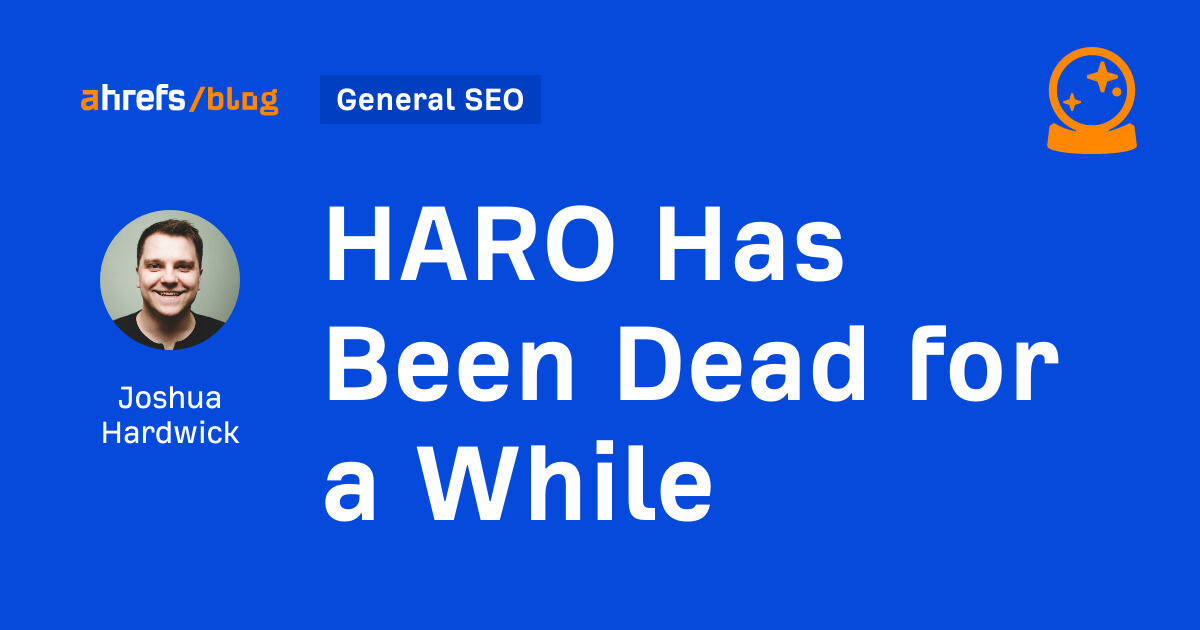
I know nothing about the new tool. I haven’t tried it. But after trying to use HARO recently, I can’t say I’m surprised or saddened by its death. It’s been a walking corpse for a while.
I used HARO way back in the day to build links. It worked. But a couple of months ago, I experienced the platform from the other side when I decided to try to source some “expert” insights for our posts.
After just a few minutes of work, I got hundreds of pitches:
So, I grabbed a cup of coffee and began to work through them. It didn’t take long before I lost the will to live. Every other pitch seemed like nothing more than lazy AI-generated nonsense from someone who definitely wasn’t an expert.
Here’s one of them:
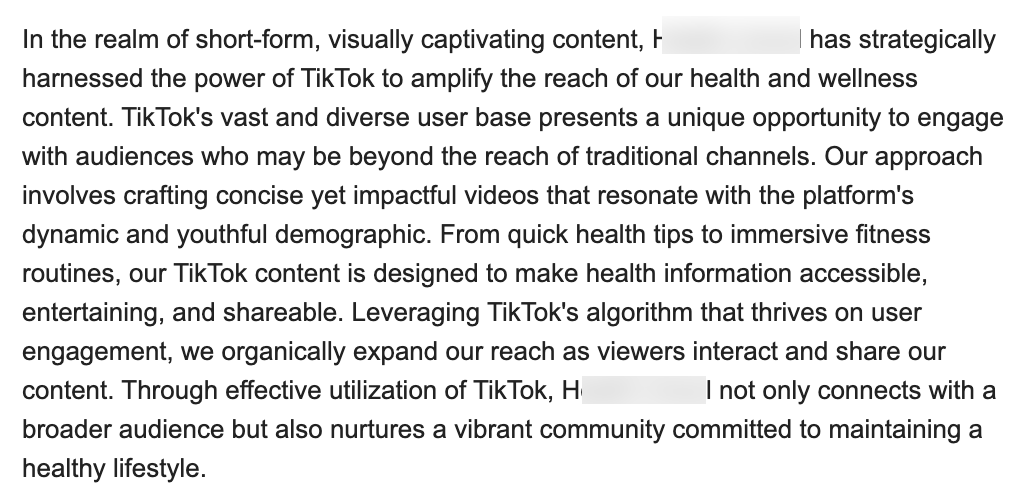

Seriously. Who writes like that? I’m a self-confessed dullard (any fellow Dull Men’s Club members here?), and even I’m not that dull…
I don’t think I looked through more than 30-40 of the responses. I just couldn’t bring myself to do it. It felt like having a conversation with ChatGPT… and not a very good one!
Despite only reviewing a few dozen of the many pitches I received, one stood out to me:


Believe it or not, this response came from a past client of mine who runs an SEO agency in the UK. Given how knowledgeable and experienced he is (he actually taught me a lot about SEO back in the day when I used to hassle him with questions on Skype), this pitch rang alarm bells for two reasons:
- I truly doubt he spends his time replying to HARO queries
- I know for a fact he’s no fan of Neil Patel (sorry, Neil, but I’m sure you’re aware of your reputation at this point!)
So… I decided to confront him 😉
Here’s what he said:


Shocker.
I pressed him for more details:
I’m getting a really good deal and paying per link rather than the typical £xxxx per month for X number of pitches. […] The responses as you’ve seen are not ideal but that’s a risk I’m prepared to take as realistically I dont have the time to do it myself. He’s not native english, but I have had to have a word with him a few times about clearly using AI. On the low cost ones I don’t care but on authority sites it needs to be more refined.
I think this pretty much sums up the state of HARO before its death. Most “pitches” were just AI answers from SEOs trying to build links for their clients.
Don’t get me wrong. I’m not throwing shade here. I know that good links are hard to come by, so you have to do what works. And the reality is that HARO did work. Just look at the example below. You can tell from the anchor and surrounding text in Ahrefs that these links were almost certainly built with HARO:
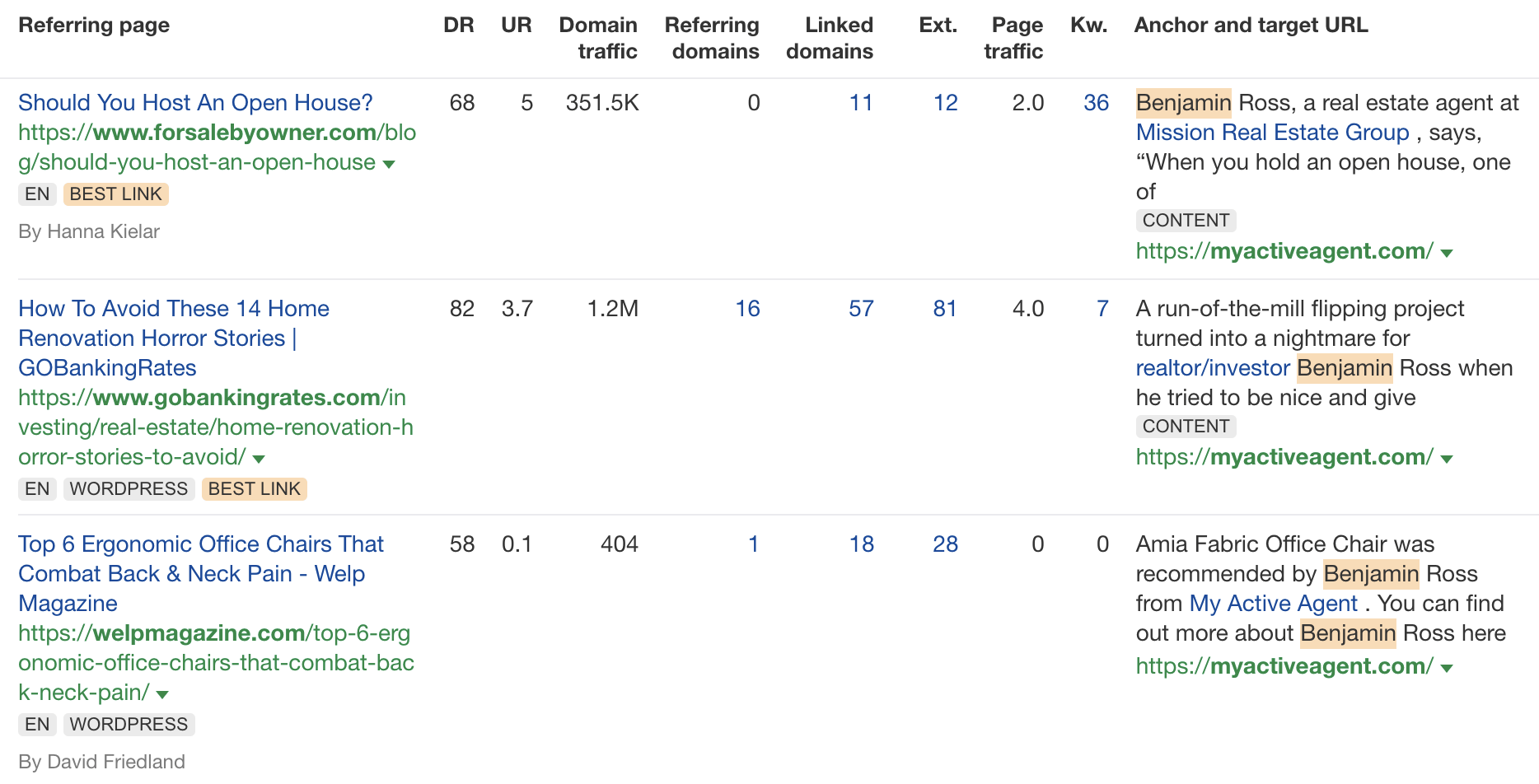

But this was the problem. HARO worked so well back in the day that it was only a matter of time before spammers and the #scale crew ruined it for everyone. That’s what happened, and now HARO is no more. So…
If you’re a link builder, I think it’s time to admit that HARO link building is dead and move on.
No tactic works well forever. It’s the law of sh**ty clickthroughs. This is why you don’t see SEOs having huge success with tactics like broken link building anymore. They’ve moved on to more innovative tactics or, dare I say it, are just buying links.
Sidenote.
Talking of buying links, here’s something to ponder: if Connectively charges for pitches, are links built through those pitches technically paid? If so, do they violate Google’s spam policies? It’s a murky old world this SEO lark, eh?
If you’re a journalist, Connectively might be worth a shot. But with experts being charged for pitches, you probably won’t get as many responses. That might be a good thing. You might get less spam. Or you might just get spammed by SEOs with deep pockets. The jury’s out for now.
My advice? Look for alternative methods like finding and reaching out to experts directly. You can easily use tools like Content Explorer to find folks who’ve written lots of content about the topic and are likely to be experts.
For example, if you look for content with “backlinks” in the title and go to the Authors tab, you might see a familiar name. 😉
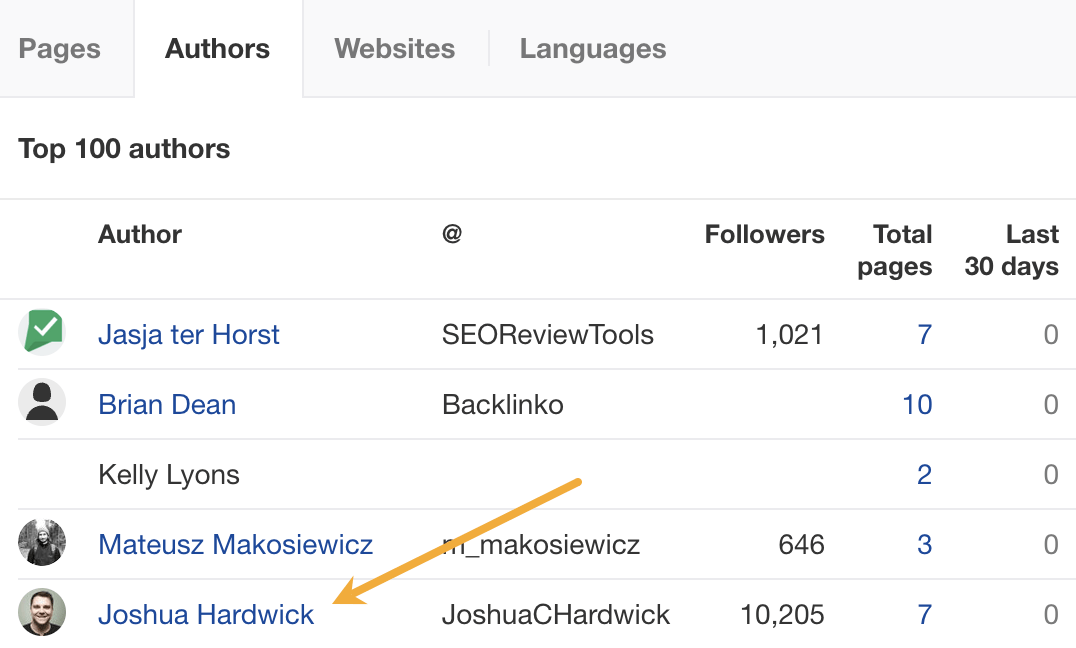

I don’t know if I’d call myself an expert, but I’d be happy to give you a quote if you reached out on social media or emailed me (here’s how to find my email address).
Alternatively, you can bait your audience into giving you their insights on social media. I did this recently with a poll on X and included many of the responses in my guide to toxic backlinks.
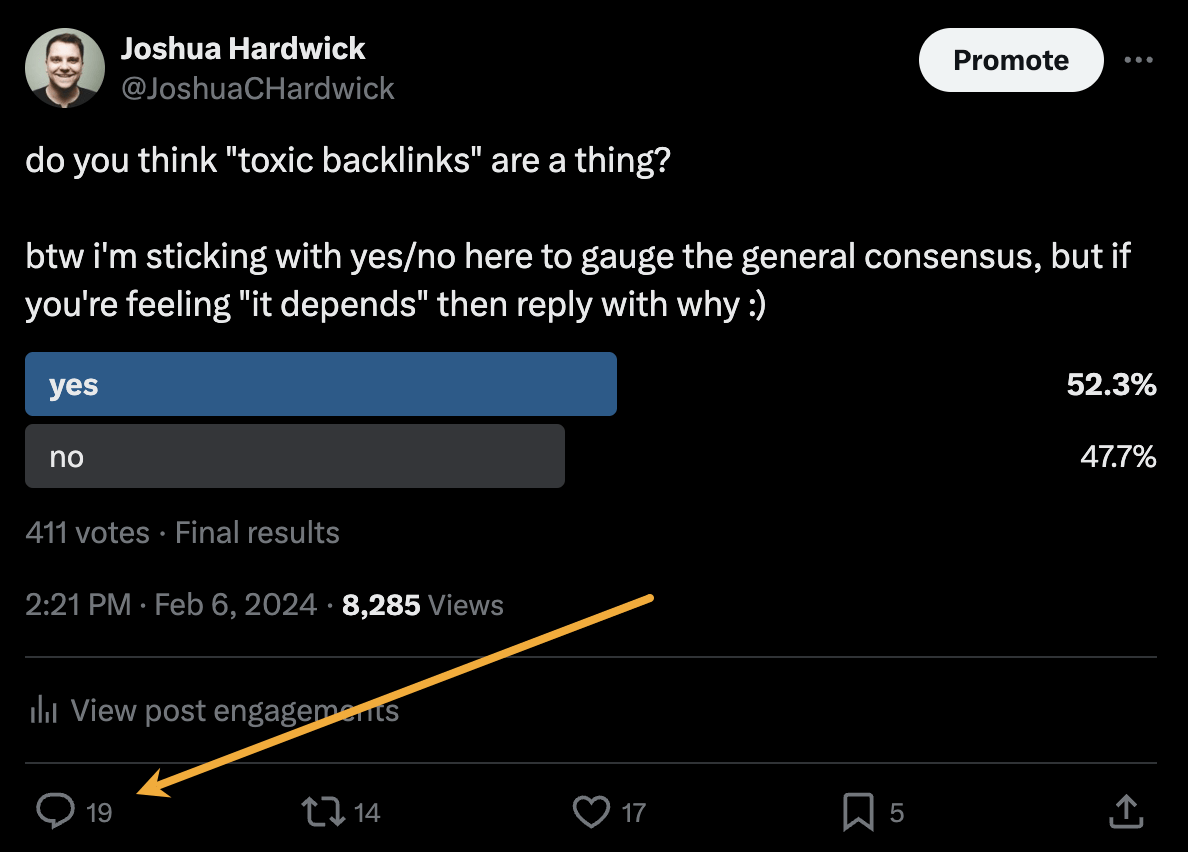

Either of these options is quicker than using HARO because you don’t have to sift through hundreds of responses looking for a needle in a haystack. If you disagree with me and still love HARO, feel free to tell me why on X 😉
SEO
Google Clarifies Vacation Rental Structured Data

Google’s structured data documentation for vacation rentals was recently updated to require more specific data in a change that is more of a clarification than it is a change in requirements. This change was made without any formal announcement or notation in the developer pages changelog.
Vacation Rentals Structured Data
These specific structured data types makes vacation rental information eligible for rich results that are specific to these kinds of rentals. However it’s not available to all websites. Vacation rental owners are required to be connected to a Google Technical Account Manager and have access to the Google Hotel Center platform.
VacationRental Structured Data Type Definitions
The primary changes were made to the structured data property type definitions where Google defines what the required and recommended property types are.
The changes to the documentation is in the section governing the Recommended properties and represents a clarification of the recommendations rather than a change in what Google requires.
The primary changes were made to the structured data type definitions where Google defines what the required and recommended property types are.
The changes to the documentation is in the section governing the Recommended properties and represents a clarification of the recommendations rather than a change in what Google requires.
Address Schema.org property
This is a subtle change but it’s important because it now represents a recommendation that requires more precise data.
This is what was recommended before:
“streetAddress”: “1600 Amphitheatre Pkwy.”
This is what it now recommends:
“streetAddress”: “1600 Amphitheatre Pkwy, Unit 6E”
Address Property Change Description
The most substantial change is to the description of what the “address” property is, becoming more descriptive and precise about what is recommended.
The description before the change:
PostalAddress
Information about the street address of the listing. Include all properties that apply to your country.
The description after the change:
PostalAddress
The full, physical location of the vacation rental.
Provide the street address, city, state or region, and postal code for the vacation rental. If applicable, provide the unit or apartment number.
Note that P.O. boxes or other mailing-only addresses are not considered full, physical addresses.
This is repeated in the section for address.streetAddress property
This is what it recommended before:
address.streetAddress Text
The full street address of your vacation listing.
And this is what it recommends now:
address.streetAddress Text
The full street address of your vacation listing, including the unit or apartment number if applicable.
Clarification And Not A Change
Although these updates don’t represent a change in Google’s guidance they are nonetheless important because they offer clearer guidance with less ambiguity as to what is recommended.
Read the updated structured data guidance:
Vacation rental (VacationRental) structured data
Featured Image by Shutterstock/New Africa
SEO
Google On Hyphens In Domain Names

Google’s John Mueller answered a question on Reddit about why people don’t use hyphens with domains and if there was something to be concerned about that they were missing.
Domain Names With Hyphens For SEO
I’ve been working online for 25 years and I remember when using hyphens in domains was something that affiliates did for SEO when Google was still influenced by keywords in the domain, URL, and basically keywords anywhere on the webpage. It wasn’t something that everyone did, it was mainly something that was popular with some affiliate marketers.
Another reason for choosing domain names with keywords in them was that site visitors tended to convert at a higher rate because the keywords essentially prequalified the site visitor. I know from experience how useful two-keyword domains (and one word domain names) are for conversions, as long as they didn’t have hyphens in them.
A consideration that caused hyphenated domain names to fall out of favor is that they have an untrustworthy appearance and that can work against conversion rates because trustworthiness is an important factor for conversions.
Lastly, hyphenated domain names look tacky. Why go with tacky when a brandable domain is easier for building trust and conversions?
Domain Name Question Asked On Reddit
This is the question asked on Reddit:
“Why don’t people use a lot of domains with hyphens? Is there something concerning about it? I understand when you tell it out loud people make miss hyphen in search.”
And this is Mueller’s response:
“It used to be that domain names with a lot of hyphens were considered (by users? or by SEOs assuming users would? it’s been a while) to be less serious – since they could imply that you weren’t able to get the domain name with fewer hyphens. Nowadays there are a lot of top-level-domains so it’s less of a thing.
My main recommendation is to pick something for the long run (assuming that’s what you’re aiming for), and not to be overly keyword focused (because life is too short to box yourself into a corner – make good things, course-correct over time, don’t let a domain-name limit what you do online). The web is full of awkward, keyword-focused short-lived low-effort takes made for SEO — make something truly awesome that people will ask for by name. If that takes a hyphen in the name – go for it.”
Pick A Domain Name That Can Grow
Mueller is right about picking a domain name that won’t lock your site into one topic. When a site grows in popularity the natural growth path is to expand the range of topics the site coves. But that’s hard to do when the domain is locked into one rigid keyword phrase. That’s one of the downsides of picking a “Best + keyword + reviews” domain, too. Those domains can’t grow bigger and look tacky, too.
That’s why I’ve always recommended brandable domains that are memorable and encourage trust in some way.
Read the post on Reddit:
Read Mueller’s response here.
Featured Image by Shutterstock/Benny Marty
-

 WORDPRESS6 days ago
WORDPRESS6 days agoTurkish startup ikas attracts $20M for its e-commerce platform designed for small businesses
-

 PPC7 days ago
PPC7 days ago31 Ready-to-Go Mother’s Day Messages for Social Media, Email, & More
-

 PPC7 days ago
PPC7 days agoA History of Google AdWords and Google Ads: Revolutionizing Digital Advertising & Marketing Since 2000
-

 MARKETING5 days ago
MARKETING5 days agoRoundel Media Studio: What to Expect From Target’s New Self-Service Platform
-

 SEO5 days ago
SEO5 days agoGoogle Limits News Links In California Over Proposed ‘Link Tax’ Law
-

 MARKETING6 days ago
MARKETING6 days agoUnlocking the Power of AI Transcription for Enhanced Content Marketing Strategies
-
SEARCHENGINES5 days ago
Daily Search Forum Recap: April 12, 2024
-

 SEARCHENGINES6 days ago
SEARCHENGINES6 days agoGoogle Search Results Can Be Harmful & Dangerous In Some Cases














